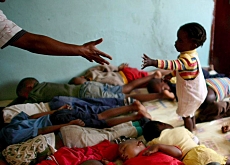
Roche shares HIV drug know-how with Africa

Swiss pharmaceutical giant Roche has announced the first step in a "transfer technology" initiative that will help African companies produce generic drugs for HIV.
Roche said on Friday it would supply free-of-charge three companies with the technical ability to manufacture generic medicine for HIV, the virus that leads to Aids.
Aspen Pharmacare in South Africa and Cosmos Limited and Universal Corporation Limited in Kenya will receive the necessary technical expertise. The Basel-based firm said another 25 companies from 14 countries, including Ghana, Zimbabwe and Nigeria were interested in the initiative.
The agreements are the first in a series of planned technology transfers for sub-Saharan Africa and the world’s Least Developed Countries, which were announced in January 2006. These countries are said to cover 69 per cent of all people with HIV/Aids worldwide.
Saquinavir is a so-called “second-line” (support) treatment which is recommended by the Geneva-based World Health Organization (WHO) to treat HIV. It is sold under the Invirase brand name.
As part of the agreement Roche has committed to work onsite at the manufacturing facilities in Kenya and South Africa and from its headquarters in Switzerland to undertake the technology transfers.
“From the interest and number of responses we have received, we know that [the initiative] has the potential to make a real difference to help those who most need it,” said William M. Burns, the chief executive officer of Roche’s pharmaceuticals division.
Positive step
Peter Graaff, team leader of Aids medicines in the HIV/Aids department of the WHO, said he supported the move on two accounts.
“Saquinavir is a product that many international experts consider useful, and also Roche has gone beyond allowing companies to produce via voluntary licence arrangements to actual technical engagement,” Graaff told swissinfo.
“This doesn’t mean that all problems have been resolved. These companies now have to actually manufacture their products and we want to know the companies’ future pricing levels. We would also like to see these products being submitted for WHO pre-qualification – a process to ensure the quality of the products going to market.”
Graaff added that the availability of saquinivir alone was not enough. “We do not advise the use of saquinivir without the other protease inhibitor ritonavir, produced by Abbott Laboratories.”
Limited options
Roche said that as access to first-line [initial] treatment in Africa continues to increase, the need for second-line treatments would grow in parallel.
“People with HIV/Aids living in sub-Saharan Africa have limited treatment options, and while there has been increased access to first-line therapy, it is vital that they are able to access and have a secure supply of second-line treatments, such as saquinavir, that are included within our WHO treatment guidelines,” explained Lembit Rägo, the coordinator of quality assurance and safety of medicines at WHO.
Roche said that under its initiative manufacturers in sub-Saharan Africa and the Least Developed Countries wishing to produce generic saquinavir for use in these countries would not be required to apply for a licence.
As part of its global policy it said it would not enforce patents on HIV anti-retroviral medicines within these countries.
Roche’s announcement in January was greeted with certain scepticism, in particular from the Swiss non-governmental organisation the Berne Declaration, which called it a PR move and questioned developing countries’ capacities to manufacture medications.
swissinfo with agencies
There are more than 38 million people living with HIV. 2.8 million people with HIV/Aids died in 2005, most of them in sub-Saharan Africa where food supplies are scarce and health systems are weak.
65 million people worldwide have contracted Aids since June 1981 and 25 million have died from the disease.
UNAids estimates that about $8.3 billion (SFr10.3 billion) was spent last year in the treatment, prevention and care of orphans in developing countries, meeting a $7-$10 billion target set five years ago.
According to the Swiss Aids Federation, more than 20,000 men and women live with HIV/Aids in Switzerland. Two people are diagnosed HIV-positive every day.
Saquinavir, whose brand name is Invirase, is recommended by the WHO to treat HIV.
Saquinavir is a protease inhibitor, one of a class of drugs which works by blocking part of the virus and preventing it from replicating itself.
Protease inhibitors are used in combination with other anti-HIV drugs in treatment cocktails which aim to reduce the amount of HIV in the body.

In compliance with the JTI standards
More: SWI swissinfo.ch certified by the Journalism Trust Initiative




























You can find an overview of ongoing debates with our journalists here . Please join us!
If you want to start a conversation about a topic raised in this article or want to report factual errors, email us at english@swissinfo.ch.